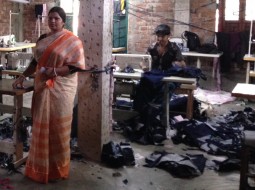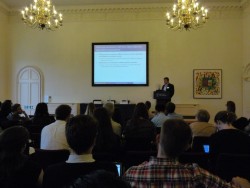Enter almost any market in Uganda, Nepal, or Peru and you are likely to find streets filled with shops all selling the same items, whether it be rows of tire shops, stores selling the same wooden furniture, or shoe shop after shoe shop. It seems that if some of these firms merged to achieve larger scale, they could make more money. Are these firms behaving irrationally, or is the market set up in a way that allows many small businesses to collaborate rather than compete? Research looking at this and other key questions about the growth of small and medium enterprises (SME) was discussed in London last December at the
Innovations for Poverty Action (IPA) SME Initiative’s fourth Working Group meeting.
SMEs are thought to be the backbone of many economies, and as a result governments and aid agencies spend billions of dollars on SME assistance each year. However, because little evidence exists on the actual barriers to growth and the most effective solutions to alleviate these constraints, SME policy is often based on theory and conjecture. To address this knowledge gap, the SME Initiative works with a network of over 60 influential researchers and decision-makers to set a policy-relevant research agenda, conduct cutting-edge research, and share findings and best practices to improve the way SME policy is implemented around the world.

Findings from two studies presented at the meeting offered a new look at an old problem – the inability of small firms to access adequate financing. Lending to SMEs is often perceived as riskier than lending to larger firms and, as a result, banks frequently impose more stringent repayment requirements on small business loans. These rigid contract terms can hamper the firm’s ability to invest in their businesses and innovate. To address this issue, researchers are asking whether more lenient loan repayment timeframes might benefit small firms and, if so, whether banks might also profit from these more flexible contracts. A benefit to both parties would make the adoption of such contracts a win-win situation and may encourage banks to revisit their standard contract requirements. In response to the first part of this question,
Rohini Pande presented evidence from India showing that contract changes that allow microfinance beneficiaries to begin repayment after two months, rather than two weeks, resulted in increased business creation and investment and long-term profit gains. Indeed, the evidence suggests that such contract modifications can create a level of growth that allows some microenterprises to develop into small businesses.
Selim Gulesci and
Andreas Madestam’s research in Uganda begins to address the second piece of the puzzle by showing that grace period contracts, similar to those used in Pande’s study, attract somewhat less risky borrowers. This means that flexible repayment contracts may present an opportunity for financial institutions in addition to loan recipients. They also presented results on the hypothetical demand for loans when other contractual terms are altered, showing that contracts with lower collateral requirements and lower interest rates attract safer borrowers. Together, these studies suggest that financial institutions and loan recipients may both benefit from greater flexibility or leniency in standard loan contracts.

Two SME Initiative affiliates presented research on another key policy question, asking whether certain management practices used in developed countries can also be productive in developing countries. Using evidence from a cross-country field experiment,
Greg Fischer discussed research done in collaboration with
Oriana Bandiera in Ghana, India, and the Philippines looking at how workers respond to performance-based pay. Early results indicate that cultural norms surrounding individualism play an important role in workers’ responses to incentives, suggesting that the best results will be achieved when personnel policies are tailored to local cultural norms.
Antoinette Schoar added to the conversation on worker productivity by presenting on an ongoing study conducted in collaboration with
David Atkin in Chennai, India on changes in output when employees work at home versus in an office or factory setting.
The next SME Initiative Working Group meeting will take place in Boston this week. Practitioners from the
African Development Bank and
Inter-American Development Bank will present on opportunities for collaboration around issues of key importance for decision-makers. A number of SME Initiative researchers will present on topics ranging from the role of technology in firm productivity to the impact of different training techniques on business performance. The full agenda for the meeting can be found on the
SME Initiative Events page. We are excited to see collaborations develop across disciplines and contribute to the design of more effective SME policies.
Watch the video below to see the network members themselves discuss the group’s work below, and see more interviews with individual researchers
here.
Watch the video below to see Rohini Pande discuss her study on flexible repayment contracts in India.
 Findings from two studies presented at the meeting offered a new look at an old problem – the inability of small firms to access adequate financing. Lending to SMEs is often perceived as riskier than lending to larger firms and, as a result, banks frequently impose more stringent repayment requirements on small business loans. These rigid contract terms can hamper the firm’s ability to invest in their businesses and innovate. To address this issue, researchers are asking whether more lenient loan repayment timeframes might benefit small firms and, if so, whether banks might also profit from these more flexible contracts. A benefit to both parties would make the adoption of such contracts a win-win situation and may encourage banks to revisit their standard contract requirements. In response to the first part of this question, Rohini Pande presented evidence from India showing that contract changes that allow microfinance beneficiaries to begin repayment after two months, rather than two weeks, resulted in increased business creation and investment and long-term profit gains. Indeed, the evidence suggests that such contract modifications can create a level of growth that allows some microenterprises to develop into small businesses.
Findings from two studies presented at the meeting offered a new look at an old problem – the inability of small firms to access adequate financing. Lending to SMEs is often perceived as riskier than lending to larger firms and, as a result, banks frequently impose more stringent repayment requirements on small business loans. These rigid contract terms can hamper the firm’s ability to invest in their businesses and innovate. To address this issue, researchers are asking whether more lenient loan repayment timeframes might benefit small firms and, if so, whether banks might also profit from these more flexible contracts. A benefit to both parties would make the adoption of such contracts a win-win situation and may encourage banks to revisit their standard contract requirements. In response to the first part of this question, Rohini Pande presented evidence from India showing that contract changes that allow microfinance beneficiaries to begin repayment after two months, rather than two weeks, resulted in increased business creation and investment and long-term profit gains. Indeed, the evidence suggests that such contract modifications can create a level of growth that allows some microenterprises to develop into small businesses.  Two SME Initiative affiliates presented research on another key policy question, asking whether certain management practices used in developed countries can also be productive in developing countries. Using evidence from a cross-country field experiment, Greg Fischer discussed research done in collaboration with Oriana Bandiera in Ghana, India, and the Philippines looking at how workers respond to performance-based pay. Early results indicate that cultural norms surrounding individualism play an important role in workers’ responses to incentives, suggesting that the best results will be achieved when personnel policies are tailored to local cultural norms. Antoinette Schoar added to the conversation on worker productivity by presenting on an ongoing study conducted in collaboration with David Atkin in Chennai, India on changes in output when employees work at home versus in an office or factory setting.
Two SME Initiative affiliates presented research on another key policy question, asking whether certain management practices used in developed countries can also be productive in developing countries. Using evidence from a cross-country field experiment, Greg Fischer discussed research done in collaboration with Oriana Bandiera in Ghana, India, and the Philippines looking at how workers respond to performance-based pay. Early results indicate that cultural norms surrounding individualism play an important role in workers’ responses to incentives, suggesting that the best results will be achieved when personnel policies are tailored to local cultural norms. Antoinette Schoar added to the conversation on worker productivity by presenting on an ongoing study conducted in collaboration with David Atkin in Chennai, India on changes in output when employees work at home versus in an office or factory setting. 











